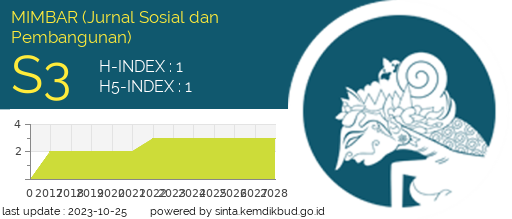The Women's Philanthopic Movement During The Covid-19 Pendemic
DOI:
https://doi.org/10.29313/mimbar.v39i1.2045Keywords:
Women's Movement, Philanthropy, Streotype, Gender, Covid-19 PendemicAbstract
The purpose of this study is to prove that stereotypes about women are gentle and protective, and irrational because they are only suitable in the domestic sector and are not worthy of being driving actors in the field of philanthropy. However, these stereotypes do not always have a negative impact, but under certain conditions they actually raise concern for vulnerable groups in the era covid-19 pandemic. This can be proven in the women's movement, the community of Kartini UIN SUKA, a community engaged in education and the Fetus and womb community which is engaged in mental health by direct interviews and using content analysis on the Fetus and Womb community Instragram which is strengthened, supported by observations and data from journals and websites. This study concludes that, during the Covid-19 pandemic, with limited space and movement due to the WFH policy, women formed a community engaged in philanthropy as a form of concern for others affected by Covid-19. Providing assistance to students in the form of groceries and educating women on mental health through virtual space is a movement that is urgently needed during the Covid-19 pandemic. This movement is not only beneficial to recipients but is also able to provide a stimulus to other groups to be motivated to foster a diverse attitude towards others even in limited circumstances. The act of driving philanthropy as well as being an actor of change is a way to break through patriarchal culture.
References
Afiah, K. N. (2022). Virtual Women Philantropy : Potret Gerakan Kedermawanan Perempuan Komunitas Rahim dan Janin di Media Sosial Masa Pandemi Virtual Women Philanthropy : A Portrait of the Women ’ s Generosity Movement for the Rahim and Janin Community on Social Media During , 7(6), 75–91.
Allal-Chérif, O., Guijarro-García, M., Ballester-Miquel, J. C., & Carrilero-Castillo, A. (2021). Being an ethical leader during the apocalypse: Lessons from the walking dead to face the COVID-19 crisis. Journal of Business Research, 133(May), 354–364. https://doi.org/10.1016/j.jbusres.2021.05.008
Amrami, K., Domnick, R., Heinzen, E., Helfinstine, K., Jayakumar, A., Johnson, P., Shah, N. D. (2021). Deployment of an Interdisciplinary Predictive Analytics Task Force to Inform Hospital Operational Decision-Making During the COVID-19 Pandemic. Mayo Clinic Proceedings, 96(3), 690–698. https://doi.org/10.1016/j.mayocp.2020.12.019
Arif, M. C. (2012). Etnografi Virtual Sebuah Tawaran Metodologi Kajian Media Berbasis Virtual. Ilmu Komunikasi, 2(2), 172–173.
Banerjee, S., Lim, K. H. J., Murali, K., Kamposioras, K., Punie, K., Oing, C., Hardy, C. (2021). The impact of COVID-19 on oncology professionals: results of the ESMO Resilience Task Force survey collaboration. ESMO Open, 6(2), 100058. https://doi.org/10.1016/j.esmoop.2021.100058
Barron, G. C., Laryea-Adjei, G., Vike-Freiberga, V., Abubakar, I., Dakkak, H., Devakumar, D., Karadag, O. (2022). Safeguarding people living in vulnerable conditions in the COVID-19 era through universal health coverage and social protection. The Lancet Public Health, 7(1), e86–e92. https://doi.org/10.1016/S2468-2667(21)00235-8
Chadwick, I. C., & Dawson, A. (2018). Women leaders and firm performance in family businesses: An examination of financial and nonfinancial outcomes. Journal of Family Business Strategy, 9(4), 238–249. https://doi.org/10.1016/j.jfbs.2018.10.002
Covid-, D. M. P. (2022). The experience of a former patient in undergoing covid-19 treatment, 9(August 2021), 33–39.
Engelman, D. T., Lother, S., George, I., Ailawadi, G., Atluri, P., Grant, M. C., Arora, R. C. (2020). Ramping Up Delivery of Cardiac Surgery During the COVID-19 Pandemic: A Guidance Statement From The Society of Thoracic Surgeons COVID-19 Task Force. Annals of Thoracic Surgery, 110(2), 712–717. https://doi.org/10.1016/j.athoracsur.2020.05.002
Gangopadhyay, K. K., Sinha, B., & Ghosal, S. (2020). “Compliance of the Indian National Task Force guidelines for COVID-19 recommendation by Indian doctors – A survey.” Diabetes and Metabolic Syndrome: Clinical Research and Reviews, 14(5), 1413–1418. https://doi.org/10.1016/j.dsx.2020.07.040
Giacomin, M., Tskhay, K. O., & Rule, N. O. (2021). Gender stereotypes explain different mental prototypes of male and female leaders. Leadership Quarterly, (March 2019), 101578. https://doi.org/10.1016/j.leaqua.2021.101578
Jung, G., Yim, S. S., & Jang, S. H. (2022). When home becomes classroom: The shifting roles of Korean immigrant mothers in the management of children’s education during COVID-19 in the US. Women’s Studies International Forum, 92(July 2021), 102598. https://doi.org/10.1016/j.wsif.2022.102598
Kasdi, A. (2019). Membangun Kemandirian Melalui Filantropi Kaum Perempuan; Potensi Kedermawanan untuk Pemberdayaan Perempuan Indonesia. PALASTREN Jurnal Studi Gender, 12(1), 99. https://doi.org/10.21043/palastren.v12i1.3184
Mengistie, T. A. (2021). Higher Education Students’ Learning in COVID-19 Pandemic Period: The Ethiopian Context. Research in Globalization, 3, 100059. https://doi.org/10.1016/j.resglo.2021.100059
Miles,M.B, Huberman,A.M. (2014). Qualitative Data Analysis, A Methods Sourcebook, Edition 3. USA: Sage Publications. Terjemahan Tjetjep Rohindi Rohidi, UI-Press.
Nafilah, Z. A., & Muflihah, . (2020). Langkah Taktis Pencegahan Covid-19 di Desa Lowayu Kecamatan Dukun Kabupaten Gresik. Prosiding Penelitian Dan Pengabdian Kepada Masyarakat, 7(2), 360. https://doi.org/10.24198/jppm.v7i2.28821
Ramaswamy, S., & Osella, F. (2018). Charity and philanthropy in South Asia: A preamble. Modern Asian Studies, 52(1), 1–3. https://doi.org/10.1017/S0026749X18000100
Shapiro, P. A., Brahmbhatt, K., Caravella, R., Erickson, J., Everly, G., Giles, K., … Shalev, D. (2021). Report of the Academy of Consultation-Liaison Psychiatry Task Force on Lessons Learned From the COVID-19 Pandemic: Executive Summary. Journal of the Academy of Consultation-Liaison Psychiatry, 62(4), 377–386. https://doi.org/10.1016/j.jaclp.2021.05.001
Stewart, R., Wright, B., Smith, L., Roberts, S., & Russell, N. (2021). Gendered stereotypes and norms: A systematic review of interventions designed to shift attitudes and behaviour. Heliyon, 7(4), e06660. https://doi.org/10.1016/j.heliyon.2021.e06660
Tanaka, H., Lee, H., Morita, A., Namkoong, H., Chubachi, S., Kabata, H., … Fukunaga, K. (2021). Clinical Characteristics of Patients with Coronavirus Disease (COVID-19): Preliminary Baseline Report of Japan COVID-19 Task Force, a Nationwide Consortium to Investigate Host Genetics of COVID-19. International Journal of Infectious Diseases, 113, 74–81. https://doi.org/10.1016/j.ijid.2021.09.070
Zhang, X., Cui, Z., He, N., & You, X. (2022). Are boys associated with weapons and girls associated with kitchenware? The extent to which gender stereotypes regarding adults extend to children. Acta Psychologica, 230(199), 103754. https://doi.org/10.1016/j.actpsy.2022.103754
Zhu, W., Liu, Q., & Hong, X. (2022). Implementation and Challenges of Online Education during the COVID-19 Outbreak: A National Survey of Children and Parents in China. Early Childhood Research Quarterly, 61, 209–219. https://doi.org/10.1016/j.ecresq.2022.07.004.














